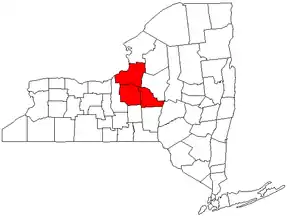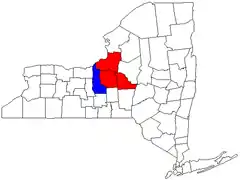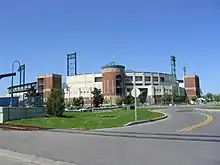

The Syracuse Metropolitan Statistical Area, as defined by the United States Census Bureau, is an area consisting of three counties in central New York, anchored by the city of Syracuse. As of the 2010 census, the MSA had a population of 662,577. In the 2000 census, the MSA had a population of 650,154.
Counties
Communities
| Census | Pop. | Note | %± |
|---|---|---|---|
| 1900 | 168,735 | — | |
| 1910 | 200,298 | 18.7% | |
| 1920 | 241,465 | 20.6% | |
| 1930 | 291,606 | 20.8% | |
| 1940 | 295,108 | 1.2% | |
| 1950 | 341,719 | 15.8% | |
| 1960 | 563,781 | 65.0% | |
| 1970 | 636,507 | 12.9% | |
| 1980 | 642,971 | 1.0% | |
| 1990 | 659,864 | 2.6% | |
| 2000 | 650,154 | −1.5% | |
| 2010 | 662,577 | 1.9% | |
| 2020 | 662,057 | −0.1% | |
| U.S. Decennial Census[1] | |||
Places with more than 75,000 inhabitants
- Syracuse (Principal city)
Places with 25,000 to 75,000 inhabitants
Places with 5,000 to 25,000 inhabitants
Places with 1,000 to 5,000 inhabitants
|
|
|
Places with less than 1,000 inhabitants
- Altmar (village)
- Boylston (town)
- Cleveland (village)
- DeRuyter (village)
- Earlville (village; partial)
- Fabius (village)
- Georgetown (town)
- Hannibal (village)
- Lacona (village)
- Madison (village)
- Munnsville (village)
- Parish (village)
- Redfield (town)
- Sand Ridge (census-designated place)
- Sandy Creek (village)
- Tully (village)
- Wampsville (village)
Hamlets
Demographics
As of the census[2] of 2000, there were 650,154 people, 252,043 households, and 164,202 families residing within the MSA. The racial makeup of the MSA was 88.36% White, 6.87% African American, 0.74% Native American, 1.61% Asian, 0.03% Pacific Islander, 0.74% from other races, and 1.65% from two or more races. Hispanic or Latino of any race were 2.08% of the population.
The median income for a household in the MSA was $39,210, and the median income for a family was $47,862. Males had a median income of $35,698 versus $25,373 for females. The per capita income for the MSA was $19,098.
Combined Statistical Area

The Syracuse–Auburn Combined Statistical Area is made up of four counties in central New York. The statistical area includes one metropolitan area and one micropolitan area. As of 2014 population estimates, the CSA had a population of 742,603.[3]
- Metropolitan Statistical Areas (MSAs)
- Syracuse (Onondaga, Oswego, and Madison counties)
- Micropolitan Statistical Areas (μSAs)
- Auburn (Cayuga County)
Sports
Current teams
| Club | Sport | League | Founded | Venue | League titles |
Championship years |
|---|---|---|---|---|---|---|
| Syracuse Mets | Baseball | IL | 1934 | NBT Bank Stadium | 8 | 1935, 1942, 1943, 1947, 1954, 1969, 1970, 1976 |
| Syracuse Crunch | Hockey | AHL | 1994 | War Memorial at Oncenter | 0 | N/A |

.jpg.webp)
Professional teams in Syracuse include:
- Syracuse Mets (International League affiliate of the New York Mets) Stadium: NBT Bank Stadium
- Syracuse Crunch (American Hockey League affiliate of the Tampa Bay Lightning) Arena: War Memorial at Oncenter
College teams in Syracuse include:
- Syracuse University Orange (NCAA Division I-A) Stadium: JMA Wireless Dome
- Le Moyne College Dolphins (NCAA Division II)
- Onondaga Community College Lazers (NJCAA)
- SUNY Environmental Science and Forestry Mighty Oaks (USCAA)
Syracuse University sports are by far the most attended sporting events in the Syracuse area. Basketball games often draw over 30,000 fans, and football games over 40,000. The university has bred dozens of famous professional players since starting an athletics program in the late nineteenth century, including all-time greats Jim Brown, Larry Csonka and Dave Bing, and present professional stars Marvin Harrison, Carmelo Anthony, Dwight Freeney, Jason Hart, and Donovan McNabb. Both teams play in the JMA Dome.
Colleges and universities
- Syracuse
- Syracuse University
- SUNY Upstate Medical University
- SUNY-ESF
- SUNY Oswego Metro Center
- Pomeroy College of Nursing at Crouse Hospital
- St. Joseph's College of Nursing
- Elsewhere in Onondaga County
- Le Moyne College in DeWitt
- Onondaga Community College in Onondaga Hill
- Bryant & Stratton College has campuses in Liverpool and Syracuse
- Columbia College has a campus at Hancock Field in Salina[4]
- Empire State College has a campus in East Syracuse
- Madison County
- Oswego County
- SUNY Oswego in Fulton, Oswego, and Phoenix
Notable persons
Several well-known individuals have ties to the Syracuse metropolitan area, including:
- L. Frank Baum – author of The Wonderful Wizard of Oz; born in Chittenango, New York
- Joey Belladonna – singer of heavy metal band Anthrax; born Joseph Belardini in Oswego, New York
- Grover Cleveland – two-term United States President; childhood resident of Fayetteville, New York
- Robin Curtis – actress of Star Trek films, resident of Cazenovia, New York
- Matilda Joslyn Gage – 19th century Fayetteville, New York feminist
- Gym Class Heroes – band from Geneva, New York
- Beezie Madden – Olympic Gold Medal Equestrian Show Jumper, resident of Cazenovia, New York
- Dave Mirra – professional BMX bike rider, former resident of Chittenango, New York
- Jonathan Murray – American television producer, born in Fayetteville, New York
- Eliza Orlins – contestant on Survivor: Vanuatu, Survivor: Micronesia, and The Amazing Race 31
- Leland Stanford – founder of Stanford University; graduate of Cazenovia Seminary
- David Foster Wallace – author, born in Ithaca, New York
- Bobcat Goldthwait – Actor, comedian, screenwriter, and film and television director born and raised in Syracuse
- Tom Kenny – Actor and comedian, voice of SpongeBob SquarePants (character), born and raised in Syracuse
- John Katko – Four-term Congressman from Camillus, New York, serving the 24th Congressional District
See also
References
- ↑ "U.S. Decennial Census". United States Census Bureau. Archived from the original on May 7, 2015. Retrieved May 28, 2013.
- ↑ "U.S. Census website". United States Census Bureau. Retrieved 2008-01-31.
- ↑ "Annual Estimates of the Resident Population by Sex, Race, and Hispanic Origin for the United States, States, and Counties: April 1, 2010 to July 1, 2014". United States Census Bureau, Population Division. June 2015. Retrieved 2015-11-16.
- ↑ "About Hancock Field Campus," Columbia College website. Accessed: 11 July 2018.
